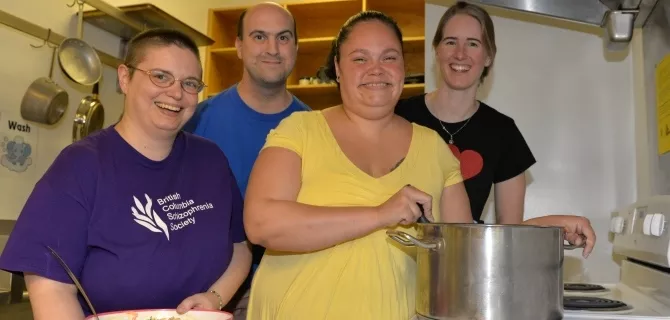Community research making a healthy difference for mental health service users

L-R: Margaret T., Andrew D., Johanna G., and dietician Olivia Jebbink prepping in the community kitchen.
Delicious meals and new social connections are helping to build a path to healthier living for participants in a Northern Medical Program (NMP) research study that began in 2013. From a community kitchen to yoga classes to quit-smoking sessions, the community-based project continues to show success.
“We have been working to develop strong and sustainable community programs in Prince George with our partners, shaped to mental health service user needs to help them engage in good health habits,” said Dr. Graham, a clinical associate professor in psychiatry with the NMP and the Faculty of Medicine at the University of British Columbia.
Individuals with enduring mental illness face a 20 per cent shorter life span due to illnesses such as diabetes, heart disease and stroke, and often struggle with health issues and high rates of tobacco addiction. In North America, mental health service users smoke 44 per cent of all cigarettes sold.
“The benefits from our research have been far reaching,” noted Dr. Graham. “Uptake of the programs has been extremely good and we have heard some powerful stories from our participants about health benefits, personal growth and social connection.”
The study’s second phase, launched last year, has focused on nutrition and tobacco reduction. Programs included a community kitchen, dietitian sessions more suited to user needs, a peer-led tobacco reduction program, and a peer-led training program.
The research is a partnership project with the BC Schizophrenia Society and Activity Centre for Empowerment (ACE). It is funded by the Vancouver Foundation, and supported by Northern Health, various community partners and health professionals. Community partners in the study’s second phase have included Youth Around Prince George (YAP), operated through the YMCA of Northern BC; the Good Food Box program; local dietitians; and a pharmacist.
"I was very excited to see so many people engaged with the community kitchen,” said Nansi Long, a coordinator at ACE. “We discovered that community kitchens are about more than just cooking food. They help develop important life skills such as communication, conflict resolution, team work and trying new things. We also reaffirmed the knowledge that cooking and eating together helps us build a stronger and more positive community.”
“It was nice to learn to cook different things that I didn't know how to make and to try new foods," said Johanna G., a participant in the community kitchen program.
“The social aspect is where I gained the most,” added Margaret T., a community kitchen peer lead. “People working together making food is one of those quintessential human things that is getting forgotten. There is camaraderie, and there is also learning that goes both ways when you are working closely together and sharing skills.”
The community kitchen and tobacco reduction programs are now sustainable with the continued financial support of Northern Health and the BC Schizophrenia Society. These programs will be made available to other mental health service users across the Northern Interior region of Northern Health.
“Smoking is the leading preventable cause of death. However, quitting or cutting down on smoking is rarely successful on the first attempt. It is a continuous effort requiring many tools,” said Jennifer Hawkes, a pharmacist in Prince George. “In working with the study’s peer-led tobacco reduction group, I was able to see first-hand the support and the normalizing of experiences that come with this form of assistance. It was wonderful to see how engaged this group was, eager to learn and asking many questions.”
“The strength of community partly lies within strong, meaningful community partnerships, and this is especially relevant in supporting individuals living with Mental Health and/or Substance Use issues,” said Aaron Bond, Northern Health’s Regional Director of Specialized Services. “It is important to have targeted efforts to improve and support the physical health of individuals living with a Mental Illness or Substance Use issue. This is an example of an effort to address health outcomes by developing healthy lifestyle interventions, and also assist in addressing the barriers to engagement encountered at times by this population. Northern Health has been happy to support this collaboration.”
The study, which began in 2013, had several key goals, which included providing behavioral lifestyle interventions that both meet client needs in overcoming barriers and empowering individuals to maintain healthy activities. An ongoing focus has been to develop sustainable community partnerships that will continue to provide initiatives to better support client health and well-being.
Partners in the first phase of the study included the YMCA of Northern BC; the Charles Jago Northern Sport Centre at UNBC; Chinook Yoga; and local health professionals.